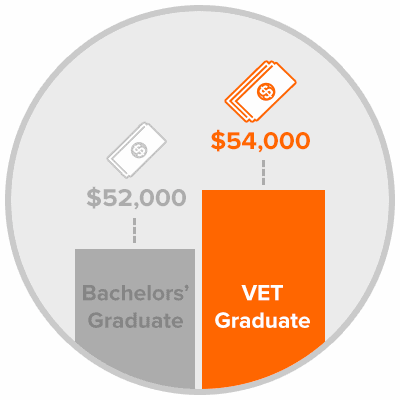
With so many myths about the usefulness of qualifications and the drive to get a ‘piece of paper’, is a diploma worth it? We’ve researched the facts about VET qualifications and just how much value they have in the modern workplace. The results may surprise you…
Should I do a diploma?
When you are wondering is it worth getting a diploma, you will need to become familiar with Australia’s Vocational Education and Training sector or VET.
VET courses include certificates I to IV, diplomas and advanced diplomas. Qualifications offered in the higher education sector include bachelor degrees, graduate certificates, graduate diplomas, masters degrees and doctoral degrees.
Is a diploma worth the cost?
VET offers students hands-on skills along with respected qualifications that are valued by employers. VET diplomas are flexible, adaptable, practical and kept up-to-date with strict guidelines. There are many ways that VET comes out on top when compared to university courses or choosing not to embark on vocational studies altogether.
15 ways a VET Diploma will give you the best return on investment
-
Higher median full-time salary than a Bachelor degree
Many people mistakenly believe that university degrees lead to better starting salaries. In reality, the opposite is true. Research shows that the median full-time income for a VET graduate is $56,000. The median graduate salary for students completing a Bachelor’s degree is actually less, at only $54,000.[1]
-
Better long-term opportunities
As the world job market continues to change it is wise to think about future career opportunities. You can relax knowing that the VET sector provides courses for 9 out of 10 occupations predicted to have the greatest growth of new jobs over the next five years. Of the ten industry subgroups with the largest projected employment gains by 2020, all can be trained for via VET courses. This includes:
- Business, HR and Marketing – 929,000 new jobs by 2020
- Specialist Managers – 719,000 new jobs by 2020
- Sales Assistants and Salespersons 889,000 new jobs by 2020
-
Credibility and competitiveness in a global economy
Department of Education and Training figures show that there were over 500,000 international enrolments into Australian tertiary courses in 2014. Almost 150,000 of these were in the VET sector[3]. Clearly, these international VET graduates will have a competitive advantage in the employment marketplace over an Australian resume without any qualifications. If VET is good enough for the rest of the world, it deserves Australia’s tick of credibility too.
-
Higher lifetime earning potential
Reports show the median lifetime earnings for those with at least a Diploma or Advanced Diploma can be around $600,000 higher[2] than those with just a Year 12 or equivalent level of education – an increase of around 35-40% on what their project lifetime earnings would otherwise stagnate at.
-
VET is fast and flexible
Skilling Australia Foundation’s 2017 ‘Perception is not Reality’[4] report states that today’s school leaver may have up to 17 jobs across 5 careers in their lifetime. The length of job tenure for working Australians, on average, is currently around 3 years. It follows that the bulk of Australia’s workers are upskilling, retraining, career changing or shifting from employment to self-employment and then back again several times over the course of their working lives. You could do 3 or more VET qualifications in the time it takes to do one 3-5 year university degree.
-
Value for money and high return on investment
In comparison with university undergraduate programs, VET usually provides students with a faster pathway to complete a qualification and enter the workforce. A Diploma qualification will have you in the workforce, earning a better award rate in faster time, for less financial investment than a University degree. In terms of lifetime earnings potential, a Diploma qualification with College for Adult Learning can give a 20,000% Return On Investment.
-
Beneficial pathways for school leavers
VET effectively engages and benefits those with no post-school education. The Australian Workforce and Productivity Agency 2012 report ‘Future Focus: Australia’s skills and workforce development needs’[5], highlighted that the increased need for skilled labour is reducing opportunities for those with only a high school level of education. To be competitive a school leaver needs to show the discipline, goal-setting and organisation skills required to achieve a qualification. VET provides a pathway to show employers these characteristics.
-
Better pass rates
The load pass rate for funded VET courses is 82.8% which is 10 percentage points higher than university courses[6].
-
Real-life skills outperform theoretical ones
VET’s high level of flexibility provides practical programs that teach real-life skills rather than just theory. As a result, as a VET graduate, you will be able to enter the workforce with first-hand experience. Rather than requiring constant retraining once employed, you will have the skills to keep building your career as a valuable team member.
-
Future-proofing against automation and the changing workplace
According to a recent 2016 survey by Chartered Accountants Australia and New Zealand, two-thirds of early-career Australians (0–5 years’ experience) expect that their job will not exist (or will fundamentally change) in the next 15 years. This means the majority expect they will have to reskill, retrain or face potential unemployment. A VET pathway gives you the ability to build additional qualifications such as a diploma, and keep working as you study online.
-
Accelerated career pathway
Beginning with a Diploma allows you to accelerate your journey up the qualification ladder while you work. You can achieve Recognition of Prior Learning ‘credits’ towards higher qualifications and shorten the time it takes to complete a Bachelor or Post-Graduate qualification. College for Adult Learning Diploma courses is recognised by all Australian Universities, TAFE’s and other private RTO’s as well as being respected in the workforce across all Australian states and territories.
-
VET and RTOs valued by employers
Across Australia, the number of employers using VET as their chosen platform for training continues to grow. A 2017 survey of ‘Employers Use and Views of the VET System’, conducted by NCVER, showed that 52.8% of employers used the VET system in 2015. That figure grew to 54.4% in 2017[6].
Employers also trust and rely on RTOs to provide quality VET qualifications. In 2017, 51.0% of employers used a private training provider, compared to 6.7% using University and 12.2% using TAFE[7].
-
The best choice for cost-effective education
In a political climate of rising education costs, it is reassuring to know that VET remains a cost-effective choice for getting a diploma. Nicholas Wyman, CEO, Skilling Australia Foundation says, ‘When compared with employment outcomes for university graduates, VET continues to produce superior results, and has proven itself to be a more flexible, accessible and adaptable platform for educating and skilling Australians than university education. Importantly, given the rising cost of formal education, VET is also a more cost-effective training option for both businesses and individuals.’
-
Greater and fairer accessibility
Entry into VET generally requires completion of schooling equivalent to Australian Years 10, 11 or 12. University entry generally has a stricter entry requirement of Year 12 graduation, weighted by the final score. VET gives a wider opportunity to people looking to advance their career possibilities.
-
Security of a world recognised system
The Australian vocational education and training (VET) system is among the most sophisticated in the world. VET stands out for being:
- Industry led – employers and industry representatives define what outcome is required from training
- National – the system is jointly managed by state, territory and Australian governments
- Client focused – it is flexible and relevant and responsive to client needs


'VET continues to produce superior results...more flexible, accessible and adaptable' - @nicholas_wyman, CEO @SkillingAus Click To Tweet

'...it is more vital than ever for Australia to prepare for the world of tomorrow' - @nicholas_wyman, CEO @SkillingAus Click To Tweet

'today’s new workers will have to be lifelong learners' @MarkMcCrindle @McCrindleRsrch Click To Tweet
Assess your ability to take on the challenge of a diploma qualification. Our unique quiz will calculate if you are in the best position right now to take on a diploma.
Do you Have What it Takes to Achieve a Diploma?

More choices are better for your back pocket
In 2016 there were 3864 private training providers. The good news for you is that this marketplace allows for you to receive a quality VET education for a competitive investment. However, keep in mind that 281 of these were either cancelled or expired. Obviously, when you are deciding is a diploma worth the cost, you want to choose a respected and well-established RTO who you can trust to deliver your diploma qualification.
The College for Adult Learning is proud to be an established Registered Training Organisation (RTO) providing nationally accredited and endorsed training qualifications. Our qualifications are recognised by all Australian Universities, TAFE’s and other private RTO’s as well as being recognised and respected in the workforce across all Australian states and territories.
The qualifications CAL deliver have been developed by industry experts and aligned to the expectations of respected industry associations, including the Australian HR Institute (AHRI) and the Australian Institute of Project Management (AIPM).
Qualifications are regularly reviewed and updated to ensure they remain relevant to world class best practice models and incorporate the latest thinking from around the world and, of course in Australian workplaces.
[1] Graduate Winners (2012), Grattan Institute (https://grattan.edu.au/wp-content/uploads/2014/04/162_graduate_winners_report.pdf)
[2] ibid.
[3] The Value of International Education in Australia (2015), Australian Government (https://internationaleducation.gov.au/research/research-papers/Documents/ValueInternationalEd.pdf)
[4] Perceptions are Not Reality (2017), Skilling Australia Foundation (https://cica.org.au/wp-content/uploads/Perceptions-are-not-Reality-May-2017.pdf
[5] Future Focus: Australia’s Skills and Workforce Development Needs (2012), Australian Workforce and Productivity Agency (https://docs.education.gov.au/system/files/doc/other/future-focus-australias-skills-and-workforce-development-needs-discussion-paper-2012.pdf
[6] VET Program Completion Rates (2011), NCVER (a href=”https://www.ncver.edu.au/__data/assets/pdf_file/0019/834220/VET-program-completion-rates-2011-15.pdf”> https://www.ncver.edu.au/__data/assets/pdf_file/0019/834220/VET-program-completion-rates-2011-15.pdf)
[7] Employers Use and Views of the VET System (2017), NCVER (https://www.ncver.edu.au/__data/assets/pdf_file/0025/1175830/Employers-use-and-views-of-the-VET-system-2017.pdf)
[8] ibid.